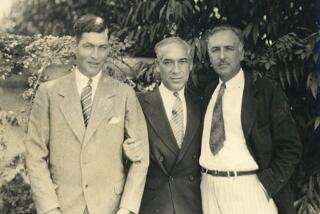Illness Without Metaphor
- Share via
In its end stages, Parkinson’s disease can reduce its victims to a frozen, rigid, mute, unblinking, locked-in state. In writing about their struggles with this disease, Joel Havemann and Michael J. Fox display the opposite qualities: nimbleness, great passion, hyper-alertness and an awareness of what is meaningful in life--as if the disease has blessed them with special vision and a unique voice. The beauty of such a narrative stance is that it not only transcends the illness but surprises and captivates the reader.
Both men can recall the exact moment when the first symptom appeared that heralded the onset of this degenerative condition. Havemann, a journalist with the Los Angeles Times, was at a restaurant eating dessert; the task of spooning raspberries from his plate to his mouth was suddenly impossible. Fox, the actor, woke up one morning to find a “ ... message in my left hand. It had me trembling. It wasn’t a fax, telegram, memo, or the usual sort of missive.... In fact, my hand held nothing at all. The trembling was the message.” The trajectory of both men’s lives was altered from that moment on, and these memoirs are the result.
“A Life Shaken” opens with Havemann sitting in his office at the Washington bureau of The Times. He is on a deadline and work is piling up, but his arms and legs shake uncontrollably. He can do nothing but wait for his pills to take effect. When, after a long time, they do, he notes: “With Parkinson’s it feels so good just to feel ordinary.... When my pills are working, I can move as smoothly as the next guy. I can live life pretty much as I did before Parkinson’s landed me in the windowless room.”
Befitting Havemann’s vast experience as a journalist, “A Life Shaken” works hard to educate the reader about Parkinson’s disease, a condition associated with the triad of tremor, rigidity and diminished movement. There are diagrams of the brain and basal ganglia, and illustrations of the means by which the neurotransmitter dopamine affects movement and muscle tone, and how its depletion in Parkinson’s patients can affect muscle control in the entire body.
He reviews the history, the surgical options and the promising research in Parkinson’s disease. But Havemann’s scientific discourse never feels burdensome, perhaps because we have identified with him so keenly from the opening pages, and we find ourselves seeking the same knowledge about Parkinson’s that he has discovered.
His own Parkinson’s saga has evolved over 11 years, beginning as he managed a demanding job as a foreign correspondent in Brussels. His aging father’s illness, his mother-in-law’s dementia and the pleasures and trials of marriage and fatherhood often eclipsed his own battles to control his symptoms.
Meanwhile, “every week, every month, every year, the Parkinson’s beast grows fiercer.” But, he says, “Parkinson’s wins if it makes me focus on the long term--and give up. My strategy is to concentrate on the short term--and keep going.” By the end of the book, we find ourselves rooting for this person we did not know before.
By contrast, we all feel we know Fox before we pick up his book. But perhaps we only thought we knew him. In “Lucky Man,” Fox writes: “Contrary to the happy-go-lucky image I cultivated, there were things that worried me more than I’d let on. My health, however, had never been one of them.” He was completely unprepared for the “two words the neurologist bludgeoned me with that day: Parkinson’s disease.”
After this first chapter, detailing the onset of his illness, Fox takes us back to his childhood in Canada where he was one of five children born to a Canadian army officer and his wife. Being “tiny and decidedly hyper compared to the other kids in that family, I was considered something of an oddity.” His thespian bent led to an audition for a Canadian television part and then a move to Hollywood, where he struggled. His big break came in 1982 when he was cast in the TV series “Family Ties.” “Pacific Bell had long since cut off service to my apartment, and as I spelled out my contract demands--modest by today’s standards, but incredibly lucrative given my financial straits--I was standing at a pay phone outside of a Pioneer Chicken franchise.”
Fox writes, always with humor but also with insight, about his subsequent rise to stardom and the other milestones in his life: his marriage, his first child, his drinking and subsequent sobriety. When he was diagnosed with Parkinson’s in 1991, he went into a sort of denial, not seeing a neurologist, popping the pills for Parkinson’s disease which he carried loose in his pocket so that he could always be “on” when he was on camera. By 1994, “My unwillingness to let [wife] Tracy and [son] Sam see a version of me any less than ideal put a certain distance between us ... so I lowered my guard at home, allowed myself to be open with my symptoms around my family. What a relief it was to relax for a change.”
Unlike Havemann, Fox chose ablative neurosurgery to relieve the symptoms on his left side. Parkinson’s often affects one side of the body before spreading to the other. The surgery involves screwing a halo onto the skull, taking radiographic pictures and, after careful measurement, passing a needle into the brain to destroy specific cells. It is hazardous but can dramatically relieve certain symptoms.
The surgery was successful, but to his great dismay, symptoms soon developed on his right side. In 1998, Fox went public with his disease, and his celebrity did much to bring attention to it. “In the last couple of years, I’ve gone from talking to my agent on a cellular phone to discussing cellular biology with some of the world’s leading scientists.”
Havemann and Fox both hope that a cure for the disease will come soon, perhaps in their lifetime. President George W. Bush’s announcement last year of severe restrictions on funding fetal stem-cell research seems particularly shortsighted after reading these memoirs. The Michael J. Fox Foundation, as if to counter this Luddite trend in Washington, has offered a $2.5-million grant to the first researcher able to create a line of cells that produces dopamine.
The authors of these two poignant memoirs are very different men. What they have in common, however, is not just Parkinson’s, but the fact that both have led interesting lives and both write well. One senses that their memoirs would make good reading whether or not they had Parkinson’s disease. But their affliction has given them a heightened sense of observation, a unique narrative stance, which allows them to see the world in a different light. And both men have been “lucky”--the sense in which Fox titles his book--in finding meaning in their lives. It is precisely the sort of remove and insight that so often escapes people who are in good health.
More to Read
Sign up for our Book Club newsletter
Get the latest news, events and more from the Los Angeles Times Book Club, and help us get L.A. reading and talking.
You may occasionally receive promotional content from the Los Angeles Times.







